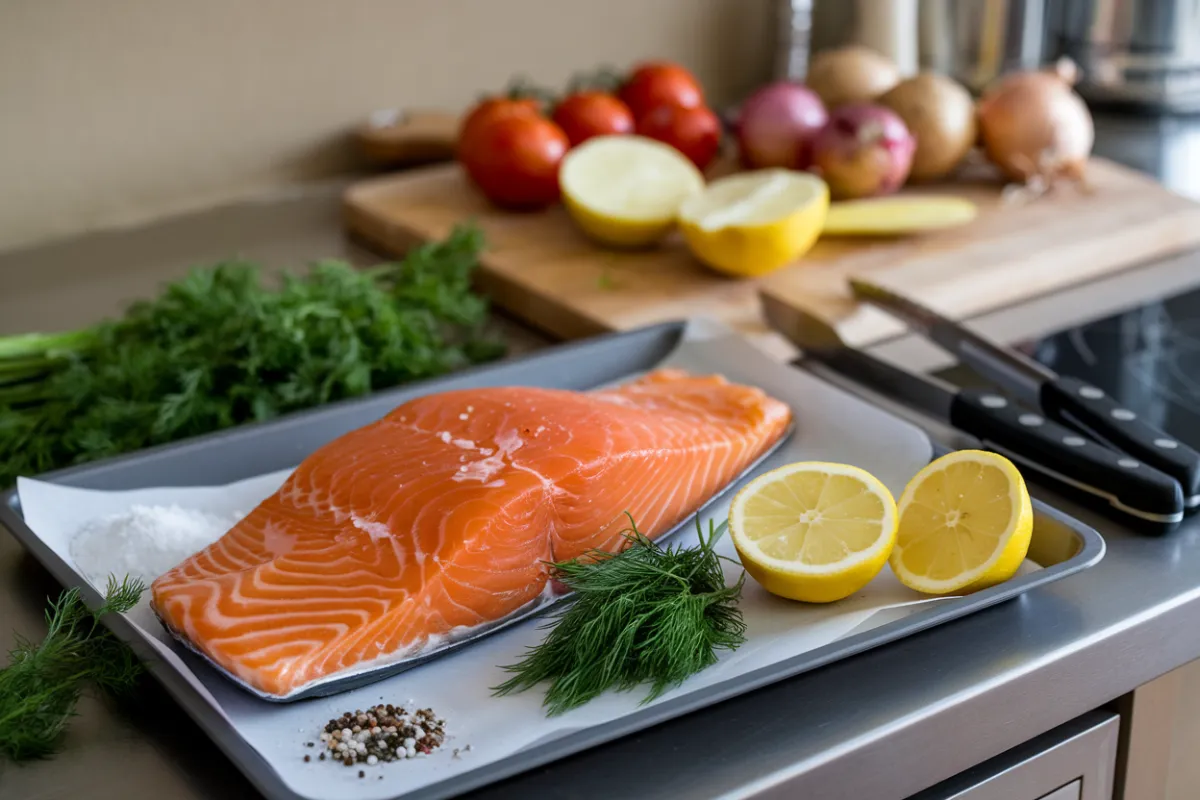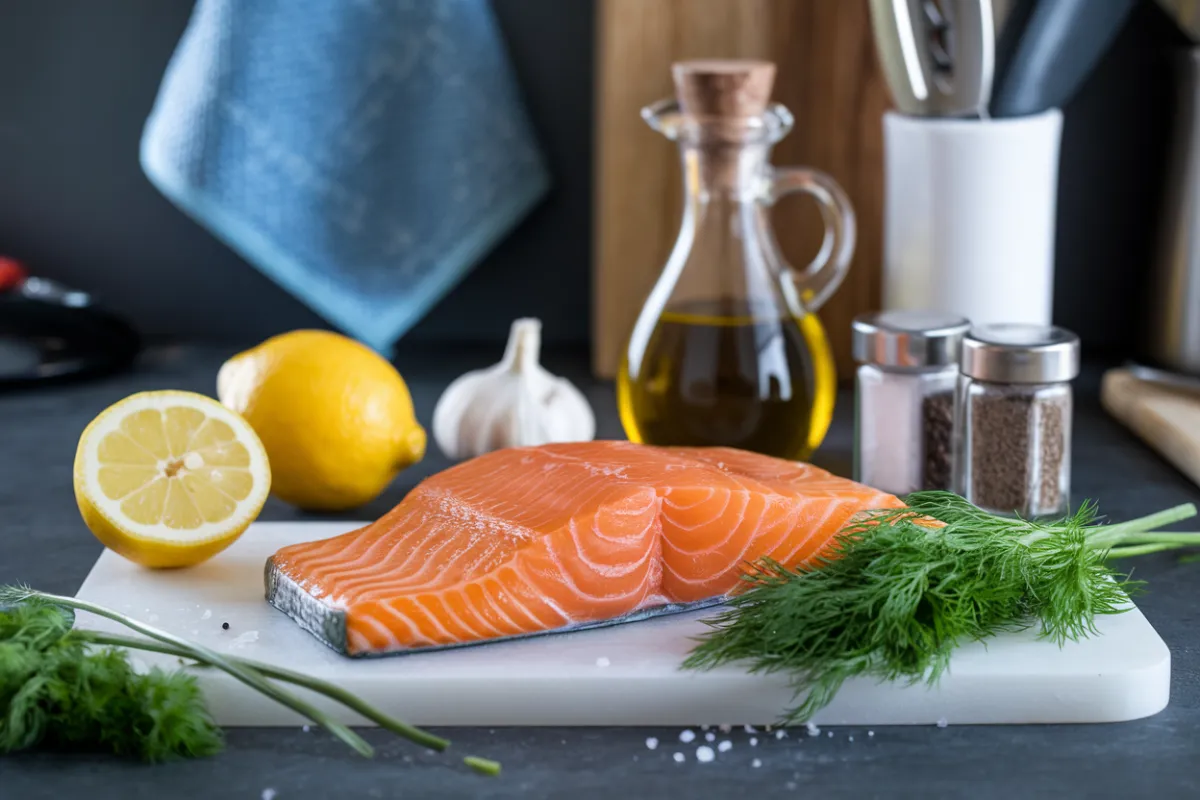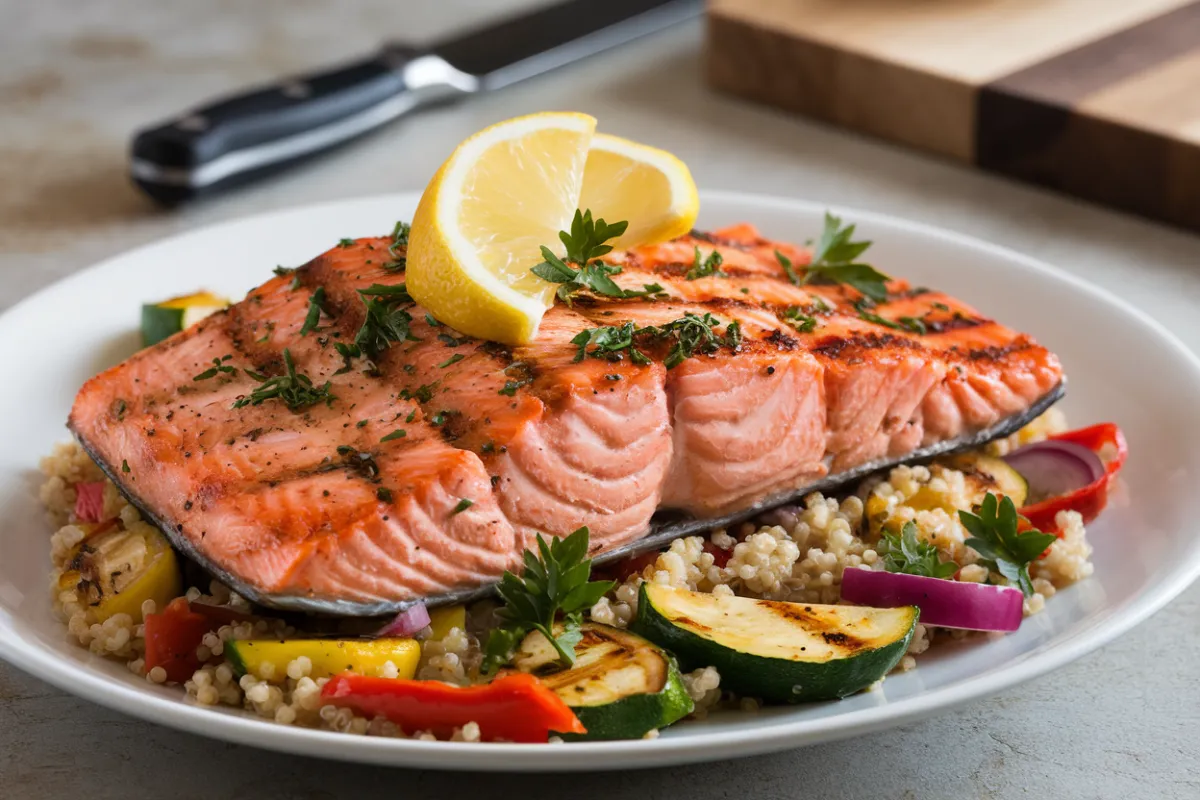Grilled salmon is frequently considered one of the healthiest proteins for your diet, thanks to its high content of omega-3 fatty acids, vitamin D, and protein. These nutrients support heart health, muscle building, and brain function, making it an ideal choice for those focused on losing weight or improving overall wellness. Its versatility in cooking allows it to be paired with a variety of low-calorie, nutrient-dense sides like vegetables or grains, making it easy to fit into different dietary plans such as keto, Mediterranean, or low-carb.
Whether you’re grilling it for a light salad or serving it alongside roasted vegetables, grilled salmon delivers high nutrition with relatively few calories, making it an excellent option for those seeking to maintain or lose weight while still enjoying flavorful meals.
The Nutritional Benefits of Grilled Salmon
Grilled salmon is a rich source of protein and omega-3 fatty acids, which are crucial for maintaining heart health, reducing inflammation, and promoting brain function. Salmon is also packed with essential nutrients such as vitamin D, selenium, and vitamin B12, making it an incredibly nutrient-dense food.
1. High-Quality Protein
Protein is an essential macronutrient that helps your body repair tissues, build muscle, and produce enzymes. One of the standout benefits of grilled salmon is its high-quality protein content. A standard serving of salmon (about 3-4 ounces) contains roughly 25 grams of protein. This makes salmon an excellent choice for people looking to increase their protein intake, whether for muscle building or weight loss.
- Why protein matters for dieting: Foods high in protein help you feel fuller for longer periods, reducing the urge to snack and helping you maintain a caloric deficit, which is essential for weight loss.
2. Omega-3 Fatty Acids for Heart and Brain Health
Salmon is loaded with omega-3 fatty acids, which are crucial for heart health. These essential fats help reduce inflammation, lower blood pressure, and decrease the risk of heart disease. Omega-3s are also known to support brain health by improving cognitive function and slowing the progression of age-related mental decline.
- Why omega-3s matter for weight management: Studies suggest that omega-3s can improve metabolic rate and enhance fat-burning processes, particularly in individuals with high insulin sensitivity. They also help reduce inflammation, which is a key factor in many chronic diseases, including obesity.
For more detailed information on omega-3 benefits, visit Healthline’s guide on omega-3 fatty acids.
Low in Calories, High in Nutrients
One of the biggest advantages of grilled salmon is that it provides a lot of nutrition without a lot of calories. A typical serving of grilled salmon contains about 200-250 calories, depending on the preparation method, making it a calorie-efficient source of protein and healthy fats.
3. Nutrient Density
Beyond its high protein and fat content, salmon is rich in several key vitamins and minerals:
- Vitamin D: Vital for bone health and immune system support, a single serving of salmon can provide up to 80% of your daily vitamin D needs.
- Vitamin B12: Crucial for brain function and the formation of red blood cells, vitamin B12 is abundant in salmon.
- Selenium: An antioxidant that protects against cell damage and plays a role in thyroid function.
Eating nutrient-dense foods like grilled salmon ensures that even if you’re cutting calories, you’re not missing out on essential nutrients that keep your body functioning properly.
4. How Salmon Can Help with Weight Loss
Due to its high protein and healthy fat content, grilled salmon helps you feel full and satisfied after meals, making it easier to stick to a diet. Additionally, the balance of macronutrients in salmon can help stabilize blood sugar levels, which reduces cravings for unhealthy snacks.

Heart Health Benefits of Grilled Salmon
Salmon is widely recognized for its heart health benefits, thanks in large part to its high concentration of omega-3 fatty acids. These healthy fats play a crucial role in reducing bad cholesterol (LDL) and increasing good cholesterol (HDL), making salmon an excellent choice for those looking to improve or maintain heart health.
5. Cholesterol Management
Incorporating grilled salmon into your diet can help lower your LDL cholesterol levels while simultaneously boosting HDL cholesterol. LDL cholesterol contributes to plaque buildup in the arteries, which can lead to heart disease, while HDL helps remove LDL from the bloodstream.
- Why cholesterol matters for dieting: Managing cholesterol levels is essential for long-term cardiovascular health. A diet rich in omega-3 fatty acids, like those found in salmon, can help reduce the risk of heart attacks and strokes, particularly in individuals with a history of high cholesterol.
6. Blood Pressure Control
Grilled salmon is also rich in potassium and magnesium, two minerals that help regulate blood pressure. Potassium helps balance out the negative effects of sodium, while magnesium plays a role in relaxing blood vessels.
- Why blood pressure control matters for weight loss: High blood pressure can strain your heart, making it harder to lose weight and maintain cardiovascular health. Eating salmon regularly can help keep blood pressure in check, especially when paired with other heart-healthy foods.
Grilled Salmon and Weight Management
Grilled salmon’s combination of high-quality protein and healthy fats makes it an ideal food for weight management. Whether you’re on a low-carb, keto, or Mediterranean diet, salmon fits seamlessly into a variety of dietary plans.
7. Keto and Low-Carb Diets
Grilled salmon is naturally low in carbohydrates and high in fats, making it an excellent choice for people on keto or low-carb diets. With its high omega-3 content and moderate protein levels, salmon provides the energy needed for ketosis without spiking insulin levels.
- Why salmon is ideal for keto: Many keto dieters struggle to find protein sources that are both high in healthy fats and low in carbs. Grilled salmon delivers both, offering a clean, nutrient-dense protein option.
8. Mediterranean Diet
Salmon is a staple in the Mediterranean diet, which emphasizes whole grains, healthy fats, lean proteins, and fresh vegetables. Grilled salmon, paired with a fresh salad or whole grains like quinoa or farro, fits perfectly into this heart-healthy eating plan.
- Why the Mediterranean diet matters: This diet is linked to numerous health benefits, including weight loss, improved heart health, and better cognitive function. Salmon, with its omega-3s and vitamins, is a central protein source for anyone following a Mediterranean eating style.
Grilled Salmon: The Healthiest Cooking Method
While there are many ways to prepare salmon, grilling is considered one of the healthiest. Grilling allows you to cook salmon without adding extra fats like butter or oil, which can increase the calorie count.
9. The Benefits of Grilling
Grilling salmon retains its nutrients while imparting a delicious smoky flavor. Unlike frying or baking, grilling requires little to no additional fats, making it a lower-calorie option. Additionally, the high heat from grilling seals in the salmon’s natural juices, making it more flavorful without the need for heavy sauces.
- Why grilling is the best option: Grilling is a quick, easy, and healthy way to prepare salmon. It preserves the fish’s nutrients while adding minimal calories, making it ideal for those looking to lose weight or maintain a healthy diet.
Creative Ways to Incorporate Grilled Salmon into Your Diet
One of the best things about grilled salmon is its versatility. You can use it in a wide range of dishes, from salads to wraps to bowls. Here are a few creative ideas to help you incorporate more salmon into your meals.
10. Grilled Salmon Salad
A grilled salmon salad is a fresh, light option for lunch or dinner. Pair your salmon with leafy greens like spinach or arugula, and add in vegetables like cucumbers, tomatoes, and avocado for a nutrient-packed meal.
- Tip: Top your salad with a homemade lemon vinaigrette for an extra burst of flavor.
Looking for more healthy meal ideas? Check out Hadley Recipes for creative salmon dishes.

11. Salmon Wraps
Wrap grilled salmon in a whole-grain tortilla with fresh veggies, hummus, or tzatziki sauce for a quick and healthy meal. This is a perfect option for meal prep or a grab-and-go lunch.
12. Grilled Salmon with Roasted Vegetables
Pair your grilled salmon with roasted vegetables like Brussels sprouts, carrots, or zucchini. Roasting brings out the natural sweetness of the vegetables and complements the smoky flavor of the grilled salmon.
- Tip: Add a sprinkle of feta cheese or nuts for extra flavor and texture.
Conclusion: Is Grilled Salmon Good for Diet?
Grilled salmon is an incredibly nutritious and versatile food that fits well into most diets. Whether you’re aiming to lose weight, improve your heart health, or simply enjoy more nutrient-dense meals, grilled salmon offers an ideal combination of protein, omega-3 fatty acids, and essential vitamins. It’s low in calories, rich in flavor, and pairs well with a variety of sides and salads, making it easy to incorporate into your weekly meal plan.
By choosing grilled salmon as part of a balanced diet, you’re not only promoting weight loss but also supporting overall health and well-being. Whether you follow a keto, Mediterranean, or low-carb diet, grilled salmon should be a staple in your meal rotation.
For more tips on how to prepare and enjoy grilled salmon, visit Hadley Recipes and explore delicious, healthy options for every meal.

